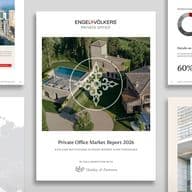- 1 min read
What the Supreme Court ruling on the Box 3 Recovery Act means for investors

The just-announced Supreme Court ruling that draws a line under the controversial Box 3 Recovery Act has significant implications for investors in the Netherlands. The ruling turns the tax and investment world upside down and raises many questions about the future taxation of investments. At Engel & Völkers, we understand how important it is for investors to stay abreast of such developments.
Background on the Box 3 Recovery Act
The Box 3 Recovery Act was introduced as a response to earlier legal and social criticism of the Dutch system of capital gains taxation.
The goal was to create a more equitable tax regime for savers and investors, where the levy would be based on a notional return with the possibility for the taxpayer to object if the return was lower. However, this law met with much controversy and was eventually brought before the Supreme Court.
- New
- New
- New
Supreme Court Ruling
On June 2, 2024, the Supreme Court ruled that the Box 3 Recovery Act violates the right to property and the principle of equality enshrined in the European Convention on Human Rights (ECHR). This is because the law still assumes a notional return that does not reflect the actual return that investors can achieve. This means that many taxpayers have unfairly overpaid taxes on their assets
What does this mean for investors?
Refund and Compensation:
Retroactive effect: Investors who have overpaid taxes since 2017 can now claim a refund. They will get money back from the Tax Administration if their actual return was lower than the flat rate return. The actual return consists of interest, dividends, rent and the returns on stocks and real estate (including paper appreciation). The Supreme Court stated that the actual return should be calculated on the basis of all assets, i.e., without deducting the tax-free assets on which people do not pay tax. Moreover, there is no need to take inflation into account: if the return in a year is 6%, but inflation is 3% in the same year, the return on which tax is due therefore remains 6%. Past positive or negative returns are also not taken into account. Moreover, any expenses may not be deducted from the return.
Compensation schemes: The tax authorities will have to ask investors for the actual returns (interest, dividends, rents and price gains) for the past years. Taxpayers should list their returns for past years.
You may also be interested in
- The world’s top 5 most exclusive ski resorts
 Your Gateway to the Iberian Real Estate Market from the Benelux Region
Your Gateway to the Iberian Real Estate Market from the Benelux Region Selling Your Home? How to Ensure a Flawless Sale in 5 Steps
Selling Your Home? How to Ensure a Flawless Sale in 5 Steps Bloemendaal
Bloemendaal- 2 min.
 The Pijp: never a dull moment
The Pijp: never a dull moment Heemstede
Heemstede- 2 min.
 What will change about the transfer tax?
What will change about the transfer tax?- 2 min.
- 30-10-2024
 Private Office Market Report 2026
Private Office Market Report 2026- 2 min.
- 03.12.2025
Contact
Contact your personal advisor


Engel & Völkers
The Netherlands
Partner of Engel & Völkers Residential GmbH
Tel: +31 (0) 20 716 24 18